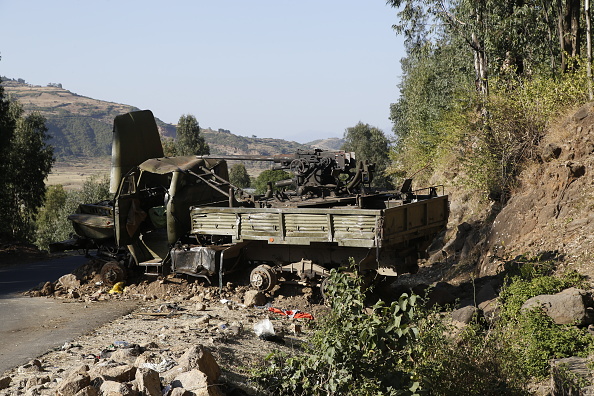Paris – War broke out in Ethiopia’s Tigray nearly two years ago when Prime Minister Abiy Ahmed deployed troops to topple the northern region’s ruling party.
The conflict has claimed an unknown number of lives, while around two million people have been driven from their homes and millions more are in need of aid, according to UN figures.
The Ethiopian government announced on Tuesday it had seized three Tigrayan towns, in a new blow to efforts led by the African Union (AU) to implement a ceasefire and launch peace talks.
Here is a timeline of the conflict:
2020: Troops enter Tigray
On November 4, 2020, Abiy orders a military response to what he calls a “traitorous” attack on federal army camps in Tigray.
He blames the Tigray People’s Liberation Front (TPLF), a former guerrilla group that dominated Ethiopian politics for nearly three decades before Abiy took office in 2018.
Neighbouring Eritrea, which signed a peace deal with Abiy in 2018 that helped him win the Nobel Peace Prize the following year, is reported to have sent troops into Tigray to help Ethiopian forces.
Two weeks later, government forces take Tigray’s capital Mekele.
– 2021: ‘Ethnic cleansing’ –
In February 2021, Amnesty International says Eritrean soldiers killed “hundreds of civilians” in November in the ancient city of Axum. In March, US Secretary of State Antony Blinken speaks of “ethnic cleansing” in Tigray.
For months, Ethiopia and Eritrea deny the involvement of Eritrean forces but in March 2021 Abiy finally admits their presence and promptly announces their departure.
Tigrayans advance
The rebels retake Mekele in late June 2021, before pushing into the neighbouring regions of Amhara and Afar.
Abiy is sworn in for a new five-year term on October 4.
Two weeks later, Ethiopian aircraft launch deadly strikes on Tigray.
Abiy leads battle
In November 2021, Abiy arrives on the frontline to personally direct government troops in battle.
In the first weeks of December government forces retake a string of towns, including Lalibela, a UNESCO World Heritage site home to 13th-century churches carved out of rock.
Rebels withdraw
In December 2021, the rebels say they are withdrawing from Amhara and Afar and the government says its forces will not advance further into Tigray.
The United Nations says dozens of civilians were killed in air strikes on Tigray in late December.
2022: ‘Humanitarian truce’
In early January 2022, the rebels say dozens of people were killed in a drone strike on a camp for displaced people in Dedebit in northwest Tigray.
In March, the government and rebels agree a truce to help accelerate delivery of emergency aid to the region.
In June, the two sides agree to the prospect of peace talks but they fail to agree on who should act as mediator, with the rebels rejecting an AU envoy.
Renewed fighting
In late August, the five-month humanitarian truce falls apart as fighting resumes on Tigray’s southern border.
The rebels accuse Ethiopian and Eritrean forces of launching a major joint offensive, marked by heavy shelling.
On September 11, Tigrayan authorities announce they are ready for a ceasefire and peace process mediated by the AU.
Three days later, 10 people are killed in twin drone attacks on Mekele but the government insists it too is “committed” to a peace process.
On September 19, UN investigators say they suspect the government of committing crimes against humanity in Tigray, including “using starvation as a method of warfare,” accusations denied by Addis Ababa.
Talks bid fails
On October 5, the government and rebels accept an AU invitation to peace talks in South Africa but the talks fail to take place, in part due to logistical issues.
On October 16, the AU asks the two parties to recommit to peace.
The rebels said they will respect a ceasefire but the Ethiopian government declines, vowing to seize airports and other federal facilities in Tigray for “defensive” purposes.
UN Secretary-General Antonio Guterres warns the situation is “is spiralling out of control”.
Government forces advance
On October 18, the federal government says its forces have captured three towns, including Shire, a city with a pre-conflict population of 100,000 situated about 50 kilometres (30 miles) from the border with Eritrea.
The rebels confirm that Shire and other areas have fallen to “invading forces”.
Follow African Insider on Facebook, Twitter and Instagram
Source: AFP
Picture: Getty Images
For more African news, visit Africaninsider.com


